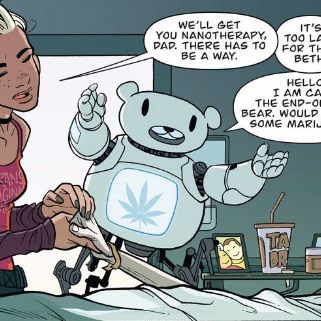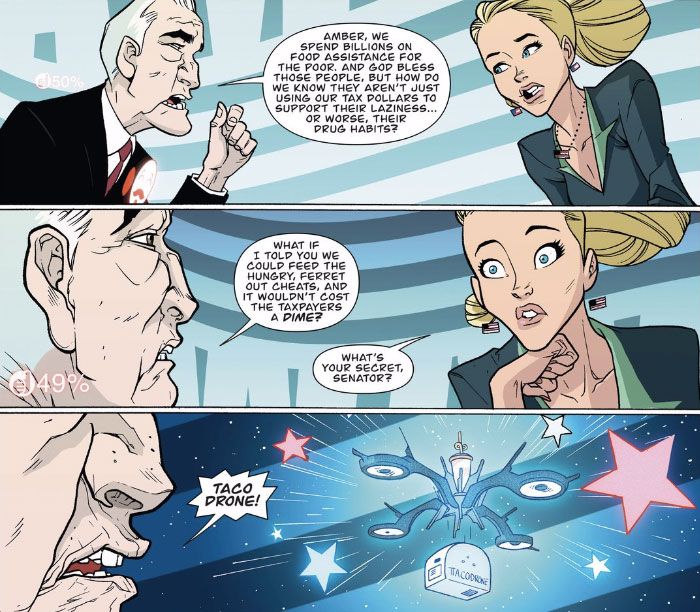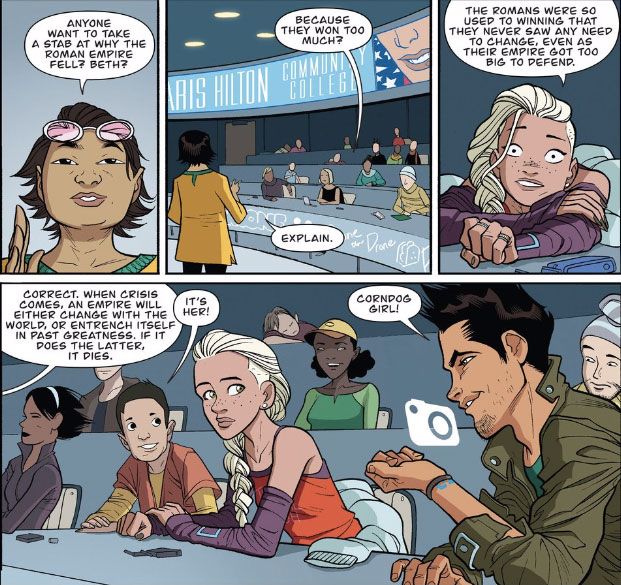
The road that brought us to DCÔÇÖs latest Prez reboot is an odd one. Created by Captain America co-creator Joe Simon and artist Jerry Grandenetti in the early 1970s, the original incarnation of the character was pitched to audiences as a charismatic Caucasian lad named ÔÇ£PrezÔÇØ Rickard, who improbably becomes the first teenage president of the United States. The series failed to catch on, not least of all because of its garbled, vaguely-but-not-quite-radical-enough political bent. In the ÔÇÿ90s, Prez saw a brief resurgence as a brief, darkly comic side-story in Neil GaimanÔÇÖs seminal Sandman and again in a 1995 story written by a then-green Ed Brubaker for DCÔÇÖs Vertigo comics imprint. Frank Miller even made Prez a sinister hologram in The Dark Knight Strikes Again. Nobody cared about Prez. He was a joke character on par with comic oddities like Animal Vegetable Mineral Man or Brother Power the Geek, occasionally trotted out by some enterprising creative team for a page then discarded. So, with all this in mind, itÔÇÖs remarkable that not only is Mark Russell and Ben CaldwellÔÇÖs 2015 reimagining of Prez a great comic, itÔÇÖs the best satire comics has seen in years.
Set 21 years in our future, Prez has proved eerily prescient of national news over these last few months. The titular Prez, reimagined as teenage fast-food worker Beth Ross, is elected to the presidency through an arcane series of events after a video of her burning her hair in a deep fryer goes viral. Even ignoring that we currently have someone famous for acting stupid riding through the primaries on a wave of irony, BethÔÇÖs unwilling candidacy for high office via the ÔÇ£Corndog GirlÔÇØ YouTube video was mirrored in actual reality when 15-year-old candidate ÔÇ£Deez NutsÔÇØ famously surged in the polls. A week after the New York Times published its┬áscathing expos├® of white-collar worker conditions inside Amazon, Prez No. 3┬áopened with a suspiciously Jeff BezosÔÇôesque Boss Smiley (PrezÔÇÖs primary foe in the Simon comics, here largely unchanged except that his trademark smiley face is a hologram obscuring his face at all times) demanding his retail-goods factory workers submit to reviews of the tiniest aspects of their daily work before ascending to the sky to the tune of Neil YoungÔÇÖs ÔÇ£RockinÔÇÖ in the Free World.ÔÇØ┬áBeth has a ÔÇ£SickstarterÔÇØ campaign to pay for her dying fatherÔÇÖs outrageously overpriced medical care ÔÇö how many of us have contributed to a sick friend or loved oneÔÇÖs GoFundMe? With Prez, Russell brilliantly distorts the very real-world issues you and I face in the news every day with funhouse-mirror weirdness.

The bookÔÇÖs major theme, the humiliating commodification of human life, is appropriately unsubtle: Groups of men stand in the rain forming a living PAYDAY LOAN sign, and the poor are made to wear ÔÇ£Taco DroneÔÇØ ads on their clothing in exchange for government-subsidized fast food in a program thatÔÇÖs proposed to replace SNAP. A character is fired for taking a bathroom break thatÔÇÖs several seconds too long. ThatÔÇÖs not even getting the fact that the book features Middle Eastern children getting shot in the streets by military robots remotely operated by snack-munching slobs in beanbag chairs. That all of these things feel only a little far-fetched in reality speaks to the bookÔÇÖs genius.
The staggering level of complexity and detail series artist Ben Caldwell (and, in issue No. 4, Dominike ÔÇ£DomoÔÇØ Stanton) builds into the world of Prez is astonishing, especially for a monthly comic. The book is full of bizarre background gags, like the ÔÇ£Corn Dog Pleasure AnalyticsÔÇØ screen in BethÔÇÖs bossÔÇÖs office or the fact that Lil DoggieÔÇÖs House of Corndogs makes employees wear hats that constantly scream ÔÇ£ASK ABOUT OUR SPECIALS.ÔÇØ Beyond being funny, CaldwellÔÇÖs use of visual signifiers adds a whole new level to certain sequences. When Senator Thorn and spineless Democratic presidential candidate Tom Downey debate ÔÇ£The Predatory Pork ActÔÇØ on a pseudoÔÇôFox News program, we watch their up-votes from viewers go up or down in ÔÇ£real timeÔÇØ via onscreen icons. We get used to these background details, so when Caldwell throws a curveball at the reader (like a Honduran child waving from behind the walls of a human zoo in issue two), weÔÇÖre floored. And you canÔÇÖt talk about Prez without talking about how the book uses color. Jeremy LawsonÔÇÖs palette for the book accentuates the mundane whites and grays of daily life in future America with the hot pinks and pale blues of the booksÔÇÖ ubiquitous holographic displays and ads.

A big part of why Prez works is ÔÇ£Corndog GirlÔÇØ herself. The book takes its time letting us get to know Beth Ross. As of the first issue, we know her favorite band is Trans Vaginal Mesh, that sheÔÇÖs stuck in a dead-end job, and that her father is dying of cat flu in a budget hospital. Despite being elected to high office against her will, Beth is an intelligent person who wants to do the right thing. Her inauguration speech in issue three is the kind of powerful character monologue Aaron Sorkin loses sleep wishing he could write:
ÔÇ£I know I donÔÇÖt deserve to be here. That this whole situation is backwards. I suppose I should feel guilty about that. But then, so much of this country is backwards. People with real problems donÔÇÖt have the money to fix them. And the people with money donÔÇÖt have any real problems. Our wealth has gotten bored. ItÔÇÖs gone on permanent vacation at offshore banks and in China, while the work at home remains undone. WeÔÇÖve turned our economy into a lottery and tell ourselves its okay because occasionally someone wins.ÔÇØ
The shadowy cabal running PrezÔÇÖs America ÔÇö faceless corporate avatars in suits with names like Pharma-Duke and Grizzly Tobacco ÔÇö is at first threatened by RossÔÇÖs status as an unknown whom they canÔÇÖt manipulate or buy. After her inauguration speech, it becomes clear sheÔÇÖs also an intelligent and capable opponent. Beth Ross feels like a real person rather than an obnoxious author stand-in, whose righteousness and anger feel like a natural extension of who she is: one of the millions of working poor hurt by the broken status quo maintained by Boss Smiley and his cronies. Whereas the original Prez (a version of whom appears in the series as a sort of Joe BidenÔÇôesque mentor to Beth) was imagined as an unflinchingly noble teen president, much of this comic centers around the inherently decent Beth struggling to do the right thing in the face of her own doubts and a seemingly unbeatable political machine. ItÔÇÖs BethÔÇÖs nobility that gives the book a grounded, vigilant optimism amid heavy farce such as the marijuana-dispensing helper robot Carl, the-End-of-Life Bear.
Just as SimonÔÇÖs original Prez comic was a strange little mutant among the capes-and-tights comics of its day, the unapologetically political Prez is
a stark contrast to not just DCÔÇÖs current slate of books but to anything mainstream comics are publishing. ItÔÇÖs hysterical, itÔÇÖs sad, and, most important, it doesnÔÇÖt pull any punches. HereÔÇÖs hoping for a second term in office after this six-issue mini-series (ominously, it was originally slated for 12 books) concludes.

